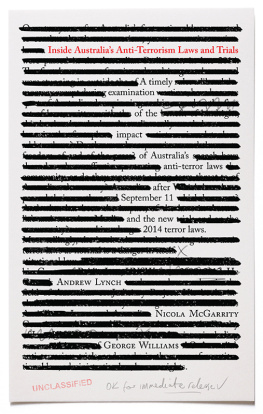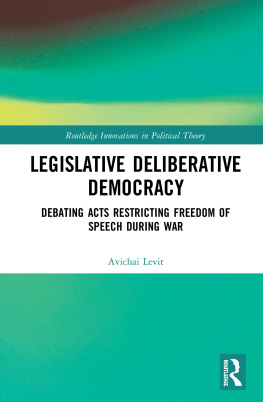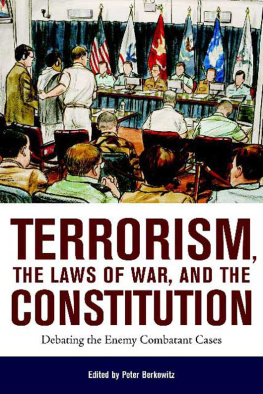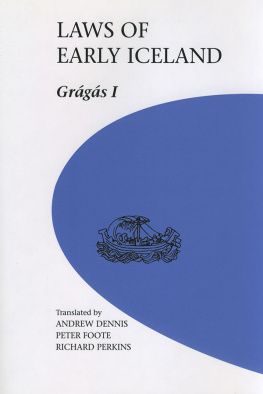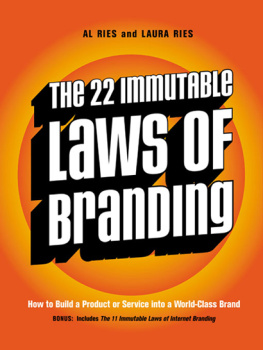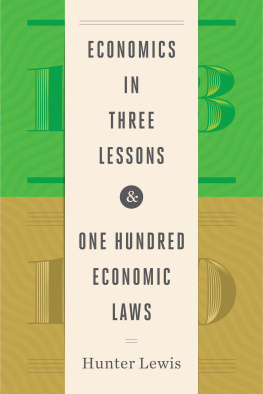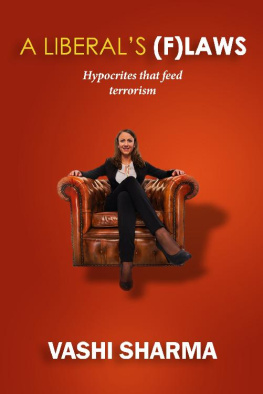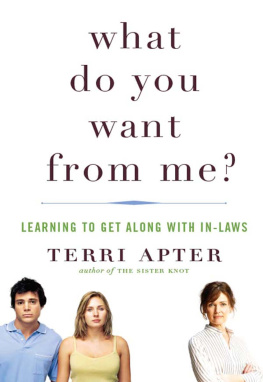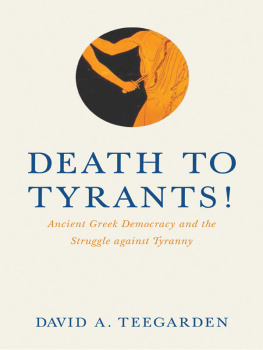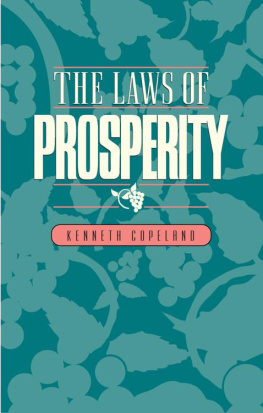Inside Australias Anti-TerrorismLaws and Trials
ANDREW LYNCH teaches and researches in the field of Australian constitutional law and was the Director of the Gilbert + Tobin Centre of Public Law, UNSW, from 2008 to 2013. He currently directs the centres Judiciary Project. His books include What Price Security? Taking Stock of Australias Anti-Terror Laws and Law and Liberty in the War on Terror.
NICOLA MCGARRITY is a lecturer in the Faculty of Law, UNSW. She also directs the Terrorism Law Reform Project in the Gilbert + Tobin Centre of Public Law. Her books include Counter-Terrorism and Beyond: The Culture of Law and Justice After 9/11 and Surveillance, Counter-Terrorism and Comparative Constitutionalism. She has previously practised as a barrister in constitutional, administrative and criminal law.
GEORGE WILLIAMS is one of Australias leading constitutional lawyers and public commentators. He is the Anthony Mason Professor, a Scientia Professor and the Foundation Director of the Gilbert + Tobin Centre of Public Law at the Faculty of Law, UNSW. His books include Australian Constitutional Law and Theory and The Oxford Companion to the High Court of Australia. He practises as a barrister and is a columnist for the Sydney Morning Herald.
Inside Australias Anti-Terrorism Laws and Trials
Andrew Lynch, Nicola McGarrity and George Williams

A NewSouth book
Published by
NewSouth Publishing
University of New South Wales Press Ltd
University of New South Wales
Sydney NSW 2052
AUSTRALIA
newsouthpublishing.com
Andrew Lynch, Nicola McGarrity and George Williams 2015 First published 2015
This book is copyright. Apart from any fair dealing for the purpose of private study, research, criticism or review, as permitted under the Copyright Act, no part of this book may be reproduced by any process without written permission. Inquiries should be addressed to the publisher.
National Library of Australia Cataloguing-in-Publication entry
Creator: Lynch, Andrew, 1973- author.
Title: Inside Australias anti-terrorism laws and trials/Andrew Lynch, Nicola McGarrity, George Williams.
ISBN: 9781742231310 (paperback)
9781742247229 (ePDF)
9781742241951 (ePub/Kindle)
Subjects: Terrorism Prevention Law and legislation Australia.
Terrorism Prevention Government policy Australia.
National security Australia.
Other Creators/Contributors: McGarrity, Nicola, author.
Williams, George, 1969- author.
Dewey Number: 344.9405325
Design Josephine Pajor-Markus
Cover design Xou Creative
All reasonable efforts were taken to obtain permission to use copyright material reproduced in this book, but in some cases copyright could not be traced. The authors welcome information in this regard.
This book is printed on paper using fibre supplied from plantation or sustainably
managed forests.

Contents
Acknowledgements
T his book is the product of more than a decade of research into Australias anti-terrorism laws and trials by the authors and other members of the Gilbert + Tobin Centre of Public Law at the University of New South Wales. This research has been made possible by the support of the Australian Research Council, initially through a Discovery Project grant and subsequently an Australian Laureate Fellowship. Parts of this book have been developed from earlier writings, including the 2006 book What Price Security? Taking Stock of Australias Anti-Terror Laws by Andrew Lynch and George Williams, and submissions made to parliamentary and other inquiries. Some of these submissions were prepared with our colleagues Rebecca Ananian-Welsh, Lisa Burton, Fergal Davis, Keiran Hardy, Sangeetha Pillai and Tamara Tulich, and we acknowledge their influence on this work. We are particularly grateful to Keiran Hardy for commenting upon and editing a draft of the manuscript. The law discussed in this book is stated as at January 2015.
Abbreviations
AFP | Australian Federal Police |
AML/CTF Act | Anti-Money Laundering and Counter-Terrorism Financing |
ASIO | Australian Security Intelligence Organisation |
ASIO Act | Australian Security IntelligenceOrganisation Act 1979 (Cth) |
AUSTRAC | Australian Transaction Reports Analysis Centre |
COAG | Council of Australian |
COAG Review | Council of Australian Governments Review of Counter-Terrorism Legislation |
Criminal Code | Criminal Code Act 1995 (Cth) |
DFAT | Department of Foreign Affairs and Trade |
Evidence Act | Evidence Act 1995 (Cth) |
Foreign Fighters Act | Counter-Terrorism Legislation Amendment (Foreign Fighters) Act 2014 (Cth) |
Foreign Incursions Act | Crimes (Foreign Incursions and |
IGIS | Inspector-General of |
Independent Monitor | Independent National Security |
LeT | Lashkar-e-Tayyiba |
LTTE | Liberation Tigers of Tamil |
NSIA | National Security Information (Criminal and Civil Proceedings) Act 2004 (Cth) |
PDO | preventative detention order |
PJCIS | Parliamentary Joint Committee on Intelligence and Security |
PKK | Kurdistan Workers Party |
SIO | special intelligence operation |
TPIM | Terrorism Prevention and |
UN Charter Act | Charter of the United Nations Act 1945 (Cth) |
Introduction
A ustralian anti-terrorism law is essentially a 21st-century phenomenon. With only a few exceptions, the laws discussed in this book have been created since the terrorist attacks on the United States of America on 11 September 2001. Unlike many other countries with a long history of politically motivated violence, at the time of those attacks Australia had no national laws criminalising terrorism or conferring special powers and procedures upon police, intelligence agencies and courts to deal with terrorism cases.
The understandable reaction of the Australian Parliament to September 11 was to fill that vacuum. The politics of what United States President George W Bush called the war on terror demanded an unequivocal commitment to ensuring the security of the Australian community. This was bolstered by an international consensus in the immediate aftermath of the attacks upon America. On 28 September 2001, the United Nations Security Council issued Resolution 1373, requiring governments to report back within just 90 days on their progress in implementing a range of measures including the creation of criminal offences for the planning, preparation and financing of terrorist acts.
In 2002, the Australian Parliament began to enact what has since become an extensive national security legislative framework. The first wave of Commonwealth laws established the definition of a terrorist act upon which that framework has been constructed. Also introduced were criminal offences for individuals, whether acting alone or through involvement with a terrorist organisation. The commission of a terrorist act is, of course, the central offence, but in practice the many other terrorism offences which were created are far more important, since they enable authorities to act pre-emptively against those planning, preparing or financing such an attack. While criminal law is often shaped by the need to punish or deter the commission of offences, the dominant principle underpinning the anti-terrorism regime is that authorities should have sufficient powers to prevent would-be terrorists before they can inflict harm upon the community.
Next page
